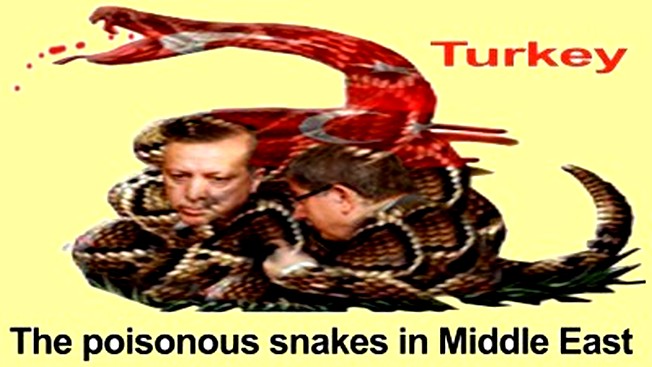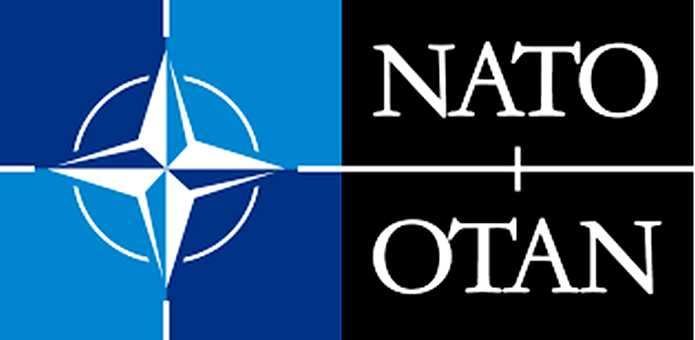
ref:topbtw-3392.html/ 16 Luglio 2022/A

As war rages between Ukraine and Russia, NATO members in Europe's east fear they might be next in Moscow's gunsights.
Finland and Sweden asked to join the transatlantic alliance.
And Turkey, a member since 1952, treated the opportunity as a visit to the bazaar,
demanding that Stockholm crack down on Ankara's Kurdish critics in return for its assent.
Why has Turkey still been considered a U.S. ally?
President Joe Biden, who will soon visit Saudi Arabia to beg for increased oil production, is taking a similarly
craven approach toward Turkey.
Despite Ankara's obstruction of NATO expansion and previous purchase of the Russian S-400 air defense system,
the president advocates selling F-16s to and upgrading existing models for Turkey.
Biden, of course, insists that no quid pro quo is involved, but his proposal conveniently comes after Turkish
President Recep Tayyip Erdogan dropped his objections to Finnish and Swedish accession to NATO.
Nor is that all.
Earlier this year, the Biden administration proposed selling missiles and radars to Turkey.
The plan was said to face "stiff headwinds" in Congress, which had insisted during the Trump administration that
Ankara be sanctioned for buying the S-400s.
When Turkey joined the transatlantic alliance, there was subdued desperation in Washington.
The U.S. was defending a still-weak Western Europe from the Soviet Union. Overmatched in conventional arms,
Washington relied on the threat of "massive retaliation" with nuclear weapons to defend the continent.
Moreover, the Korean War continued to rage, ending only the following year after the death of Soviet
leader Joseph Stalin.
No one was inclined to focus on Turkey's democratic infirmities, or its later military coups.
Indeed, Portugal was a dictatorship when it was named a founding member in 1949.
And Greece remained a member despite its infamous 1967 "colonels' coup."
However, after the Soviet collapse, NATO rushed past the European Union to welcome the detritus of the Soviet
empire, proclaiming the alliance's determination to promote democratic reform.
Even as NATO's lead member wandered the globe bombing, invading, and occupying nations at will-resulting
in hundreds of thousands of deaths along the way-alliance members proclaimed their democratic credentials:
"NATO strives to secure a lasting peace in Europe, based on common values of individual liberty, democracy,
human rights and the rule of law."
If Ankara applied for membership today, it would be firmly and brusquely rejected.
Two decades ago, Turkey was a limited democracy, with its military setting boundaries to civilian rule.
No prime minister was allowed to abandon the nationalism associated with the Republic of Turkey's founding.
Moreover, the military enforced rigid secularism, ready to defenestrate any politician or party
that approached the third rail of Islamic politics.
However, over the last two decades, Erdogan, an adept politician who rebounded from a jail
stint for publicly quoting a forbidden Islamic poem in his time as Istanbul's mayor, broke the
military's power by means fair and foul.
What little independence remained in the armed forces disappeared after the failed July 2016 coup.
At that point, he was already trending authoritarian, going from persecuted to persecutor.

Uri Friedman wrote:
"In the past year and a half, government prosecutors have opened almost 2,000 cases against
Turks for insulting the Turkish president.…
Since 2002, Turkey has dropped from 99th to 151st in Reporters Without Borders' annual ranking
of press freedom in different countries, largely because of the government's intimidation of
critical journalists and censorship of the Internet."
Erdogan used the botched putsch like Adolf Hitler used the 1933 Reichstag fire:
as an opportunity to punish political opponents and critics.
Tens of thousands of Turks have been fired, barred from traveling, or imprisoned, most for
little more than holding a critical view of Erdogan or having a distant relationship
with Fethullah Gülen's social movement, which Erdogan unconvincingly accused
of orchestrating the coup.
In the aftermath of the putsch, Erdogan transformed the government from parliamentary to presidential,
enhancing his power.
Years later, the regime continues to use Gülen to justify a continuing crackdown.
In Turkey, belief that the U.S. was involved in the incident is widespread.
According to Freedom House, Turkey has fallen to just 32 out of a possible 100 points and
is now rated "not free."
The organization explained that despite "initially passing some liberalizing reforms," the Turkish president's
Justice and Development Party (AKP) "government showed growing contempt for political
rights and civil liberties and has pursued a wide-ranging crackdown on critics and opponents since 2016.
Constitutional changes in 2017 concentrated power in the hands of the president,
removing key checks and balances."
Alas, if anything, repression is likely to deepen as next year's parliamentary and presidential
elections approach.
The economy, once Erdogan's great political strength, is a wreck.
The official annual inflation rate has hit a record 70 percent, and some economists believe the real rate is higher.
Moreover, as his popularity has declined and former political lieutenants have challenged him, Erdogan has
turned to nationalists for support.
It is unclear whether he will tolerate a free vote.
For the first time in 2019, Erdogan refused to accept an election outcome, forcing a revote
for Istanbul mayor, which his party lost disastrously.
Next year he might simply fix the outcome from the start.
However, the bigger issue for Washington is Ankara's fidelity to NATO.
Long ago the U.S. should have turned the transatlantic alliance over to the Europeans, who have
demonstrated their determination to continue to cheap ride on Americans even after proclaiming
their shock and outrage at Russia's invasion of Ukraine.
As long as Washington relies on NATO, however, it is important that members remain committed to
the Western alliance.
And Turkey is not.
Ankara has long been essentially at war with European Union member Cyprus and fellow NATO member Greece.
In 1974, Turkey invaded the former and carved out an ethnic Turkish state, the Turkish Republic
of Northern Cyprus, recognized only by Ankara.
Of late, Erdogan's government has interfered with regional energy development, claiming those resources
for the TRNC.
Moreover, successive Turkish governments have refused to accept Greek sovereignty over contested
islands and routinely invaded Greek airspace, triggering regular military confrontations.
Athens devotes a larger share of its GDP to the military than even America,
but does so mostly to confront Turkey, not Russia.
rdogan has adopted an even more aggressive, independent foreign policy than did his predecessors;
that foreign policy is often hostile to the West.
He suggested revisiting the 1923 Treaty of Lausanne, which set the boundaries of modern Turkey.
(There is much conspiracy talk about the agreement ending next year, but it has no expiration date.)
He is pushing what has been called an Ottoman foreign policy, whose nationalist supporters dream
of significantly expanding Ankara's reach.
The maritime doctrine Blue Homeland, which looks to control Mediterranean waters claimed by Cyprus, Egypt, Greece,
and Israel, is gaining support.
Indeed, Erdogan's government has clashed with French and German vessels seeking to enforce
an arms embargo on Libyan forces and U.S.-backed Syrian Kurdish forces, which with American support
defeated the Islamic State's "caliphate."
Of even greater significance is Ankara's close but complicated relationship with Russia.
That makes sense for a neighbor of a great power with which it has had fought more than one war
throughout history.
However, playing Moscow's comrade and friend is inconsistent with being a member of NATO, whose only
serious potential military adversary today is Russia.
Turkey is buying Russian weapons, inhibiting allied naval operations in the Black Sea,
and resisting allied sanctions against Moscow.
Who in the alliance believes Ankara can be relied on if NATO ends up at war with Russia?
( Doug Bandow )


- Today' NEW contacts -
I lettori di questa pagina sono: